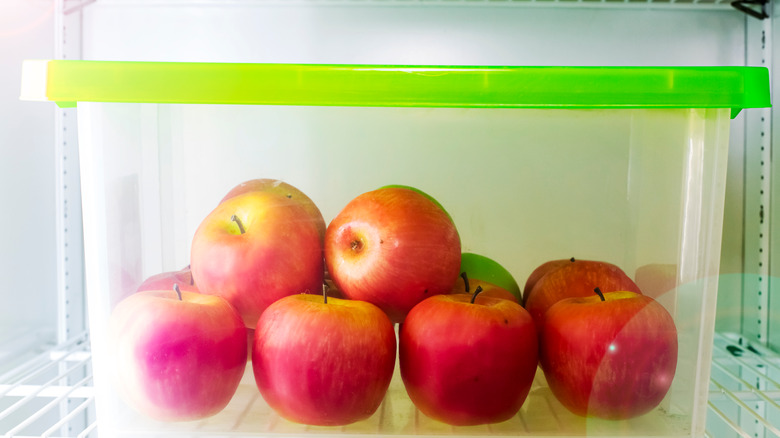Should You Throw Out All Your Apples If There's A Bad One In The Bunch?
You'll know when you're in the presence of a true apple lover. They're happy to tell you that all types of apples are tasty — Granny Smith, Honeycrisp, and Pink Lady, among them. But if you ask for advice — "Which is the best apple to snack on?" — they'll surprise you by answering "Gala, McIntosh or Red Delicious," via Taste of Home. Under friendly pressure, a true apple lover may admit that eating an apple a day may not, in fact, reduce the number of times you visit your doctor. But they will prod you into giving credit where credit is due: apples are nutritious and just might play a role in improving your long-term health, via Healthline. And on this point, a true apple lover isn't kidding. If it had been up to them, the logo of a certain technology company would have depicted a much larger missing bite. It would have been more realistic that way.
So if you find one bruised apple in an otherwise fresh-looking bag, you may be busting out of your own skin to know what a true apple lover would do: throw away only the bad apple or the entire bag?
Blame a gaseous compound
Bags of apples don't always include expiration dates. So you may be left to rely on your senses — what Michigan State University calls "eating with all five senses." If you're depending on sight to assess what Healthline calls "physical signs of expiration" like bruises, brown spots, soft spots, or oozing, you're correct to assume that something is going on. That something is the presence of a gas called ethylene, which is a ripening agent. The problem is, when a piece of fruit emits ethylene, other nearby fruits absorb it, too. And this causes them to ripen faster than usual and go bad, Penn State University says. Now a domino effect has been triggered, with the ripe fruit producing more ethylene — gathering steam, so to speak — and causing everything around it to rot. There is no slowing or stopping this process – and refrigerating a bag of apples won't help, either.
Throwing out a 3- or 5-pound bag of mostly good apples may feel wasteful, but it's the wisest move. Healthline says "... it's best to discard apples to prevent the intake of potentially dangerous compounds called mycotoxins." Focusing on that scary-sounding suffix– "toxin" — is a smart move because mycotoxins are produced by molds or fungi, via the U.S. Food & Drug Administration. And eating something with mycotoxins can make you sick (nauseated, mostly). So you may dread your next move — and the most ardent apple lovers know exactly how you feel.
Handle apples like eggs
It's time to cut your losses and try to avoid a repeat experience. While you can do only so much to prevent food waste, you can start by being proactive at the grocery store (or other point-of-purchase). It can be easy to get flush with excitement over on-sale Fuji apples, but taking the time to inspect them first makes good sense. As you now know, one bad apple can indeed spoil the bunch.
How you handle and store apples also affects their shelf life. This could mean up to six weeks in the refrigerator, three weeks in the pantry, and up to seven days on the counter, via Healthline. To help reach these goals, Food & Wine suggests you handle apples as if they were eggs — gently — so that they don't bruise. "If an apple has even a little bruise, ethylene gets emitted faster, and then everything around it rots and spoils faster."
Taste of Home recommends storing apples in containers among those of the same variety and keeping them in the crisper drawer of your refrigerator. Here, apples will stay freshest because the temperature (between 35 and 40 degrees) suits them to a T. But even the cold air won't make apples impervious to bruising. So check your apple containers or crisper drawer often and take a peek at them. If something looks "funny," it probably is. The last thing you probably want is for one more thing to upset your applecart.


